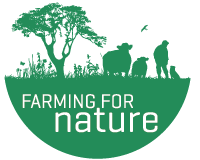Trevor Harris
Trevor run two farms, there is the home farm, 140-acres, which is cattle and sheep both organic and biodynamic certified. He grazes the two together, selling his beef directly and the lamb is through ICM. It is a mixed enterprise with 12 acres in forestry and 40acres in cereal – he sells his oats to Flavahans and his barley to make a biodynamic whiskey. The second farm is horticultural land, 14 acres outdoors and 1500sqm indoors, where he is growing vegetables for restaurants, a box scheme and retail. On both farms, Trevor is passionate about soil health which is to the fore in his approach to management of his enterprise, the focus is to build resilience in the soil through diversity. “I feel it is so important to build the fertility in the soil as where there is a good biome, the produce will taste better.” This involves getting the right mineral balance and physical soil structure to encourage soil biology to flourish. Diversity of plants also encourages diversity in the insect and bird communities which helps keep everything in balance so that no one species will dominate and cause problems for the farm crops. Sunflowers, trefoils, alliums are planted along with the cereals to bring balance. A mixed species crop of barley, oats, peas, linseed, sunflowers is grown as a fertility builder, to provide a mixed animal ration and to encourage diversity in the wildlife. Cattle and sheep are fed on a multi species sward which contains Fescue's, Timothy, Ryegrass's, Cocksfoot, Clover, Chicory, Burnet, Agri Tonic, Meadowgrass, Sheep's Parsley, and Yarrow. This leads to healthier animals and healthier humans that eat those animals. It also creates a great environment for diversity in wildlife. When Trevor took over the farm, he inherited a 100-acre field – he has replanted hedges to divide up this field and they look fantastic. They contain many species including hawthorn, cherry, spindle, hazel, oak etc. He has planted trees and hedges on the long approach to the house and yard. He has planted an oak woodland (3 acres). He has established a small orchard with a native meadow underneath. He believes “one thing we can all do is just leave our hedgerows grow and flourish”. Trevor produces good yields without any chemical inputs.
NOMINATION DESCRIPTION
This is a 57ha organic (since 1999) and biodynamic (since 2015) beef and tillage farm in County Kildare. Prior to this when the farm was managed in a conventional way sprays and chemical fertiliser was kept to a minimum. This land has never had insecticides used on it. The land is moderately well drained with a productive grey-brown podzolic topsoil. Enterprises include forestry, spring (malting) barley, spring oats, grass leys, arable silage, rye/linseed, wild bird cover/feed and a small plot of field vegetables. The oat crops are either livestock feed or for processing into porridge. The malting barley goes to Boormalt distillers for ultimate production into Demeter certified whiskey. The livestock enterprises are a 10 suckler cow herd and a 74 lowland ewe sheep flock. The focus is to build resilience in the soil through diversity (“don’t treat your soil like dirt!”). This involves getting the right mineral balance and physical soil structure to encourage soil biology to flourish. This in turn facilitates the further goal of obtaining a maximum of above ground diversity of plants and animals. Diversity of plants also encourages diversity in the insect and bird communities which helps keep everything in balance so that no one species will dominate and cause problems for the farm crops. Sunflowers, trefoils, alliums are planted along with the cereals to bring balance. A mixed species crop of barley, oats, peas, linseed, sunflowers is grown as a fertility builder, to provide a mixed animal ration and to encourage diversity in the wildlife. Cattle and sheep are fed on a multi species sward which contains Fescue's, Timothy, Ryegrass's, Cocksfoot, Clover, Chicory, Burnet, Agri Tonic, Meadowgrass, Sheep's Parsley, and Yarrow. This leads to healthier animals and healthier humans that eat those animals. It also creates a great environment for diversity in wildlife. Trevor is now also involved in an organic horticulture unit that produces salad and veg for a chain of restaurants in Dublin called Sprout Food Co. The same focus on soil health, diversity and working with nature is brought to this enterprise also. Veg and salad production is quite demanding on soil so it is even more important to have the help of nature and the wildlife that it contains. Hedgerows are never cut – they are allowed to flourish, flower and fill the margins of the fields and farm. New hedges and trees have been planted over the past 20 years. The use of the Biodynamic Preparations helps bring balance to the farming system above and below ground. The farm is part of the National Biodiversity Centre's new EIP project that aims to develop a score card that can be used to assess how pollinator friendly a farm is. Trevor is on the operational committee for the 5 years of the project. Pollinator numbers on farm will be counted to see if measures taken to encourage pollinators actually lead to an increase in numbers.
Nominator: Paul Bell, Inspector, Irish Organic Association



